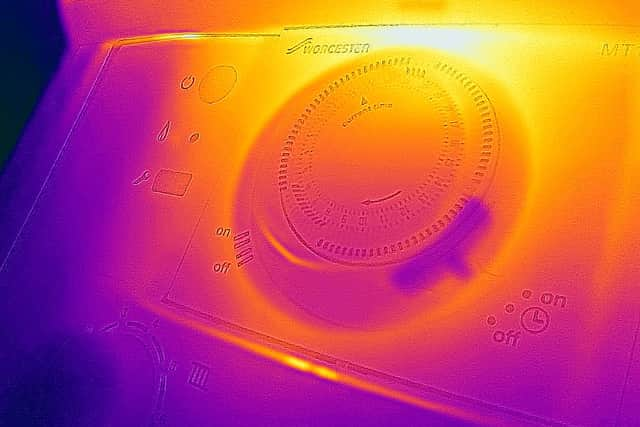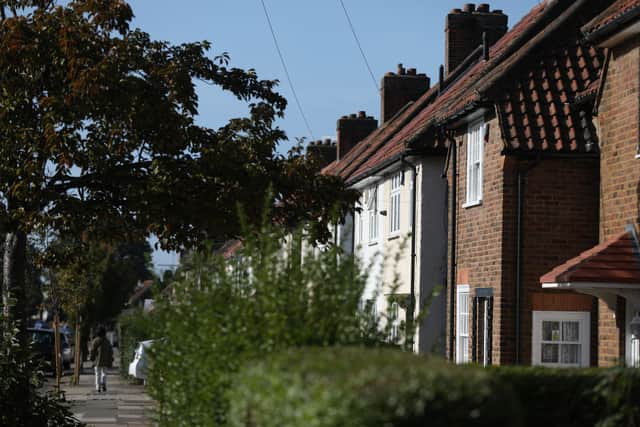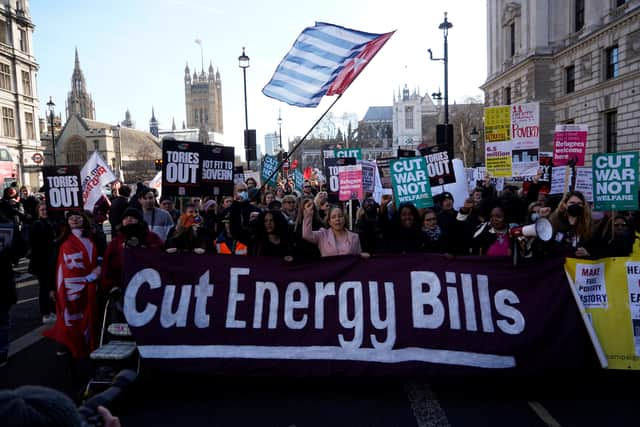Housing: UK homes lose heat up to three times faster than in Europe, report finds
and live on Freeview channel 276
The UK’s 28.6m homes are among the least energy efficient in Europe and lose heat up to three times faster than on the continent, a new study has found.
The UK trails behind other countries that have upgraded homes to cut energy bills and tackle the climate crisis, the Decarbonising Buildings: Insights From Across Europe report found.
Advertisement
Hide AdAdvertisement
Hide AdGermany, France, Sweden, Norway, Italy and the Netherlands have been rolling out multiple programmes and incentives to reduce peoples’ energy consumption and costs.
Report author Dr Salvador Acha, from Imperial College London (ICL), said: "Studies show the UK’s 28.6m homes are among the least energy efficient in Europe and lose heat up to three times faster than on the continent, making people poorer and colder.
“At a time of increased energy bills and inflation, people in the UK can’t afford to lose energy due to inefficient housing, but unfortunately policy in this area has been nil for many years. With the climate crisis, and the fact our homes account for 30% of the UK’s total greenhouse gas emissions, the planet can’t afford this lack of action either."


The report, by the Grantham Institute at ICL, comes just two weeks after the Department for Business, Energy and Industry Strategy (BEIS) announced a £1bn grant scheme.
Advertisement
Hide AdAdvertisement
Hide AdThe scheme aims to help homeowners with low energy efficiency and in lower council tax bands to insulate their homes. Yet the plan has been criticised for not opening until spring.
In Europe, governments are inventing new ways to tackle the climate and economic crisis.
In Sweden, through the widespread use of heat pumps, installation has tripled since 2000 and the country now has the highest number of heat pumps per capita in the world.
Heat pumps are low cost, energy efficient and sustainable. They use electricity to transfer warmth from the air or ground into buildings without fossil fuels or greenhouse gases.
Advertisement
Hide AdAdvertisement
Hide AdSales per 1,000 Swedish households reached 29 in 2021 - marking a steep difference from the UK that only saw 1.5 in the same year.


While Norway has all but fully decarbonised heating across the country.
Around 85% of buildings in Norway are heated using electricity. Of these buildings, 92% are produced by hydropower and 6.5% from wind.
France similarly has been doing its bit. France Rénov is a government-backed public housing renovation service offering free services including personalised advice on cost-effective renovation work to improve energy efficiency and insulation.
Advertisement
Hide AdAdvertisement
Hide AdGermany too is paving the way for efficient housing. The government set up the KfW Efficiency House standard, which provides financial incentives to improve energy efficiency.
By improving awareness of the benefits of energy efficient homes, between 2006-2016 it is estimated that the country saw an annual reduction of 8.3m tons of CO2 emissions.
The scheme also creates and safeguards 300,000 jobs a year and in 2011 alone it saved around £2.7bn for homeowners.


In July 2020, the Italian government set up a ‘Superbonus’ scheme, offering homeowners a tax credit of up to 110% on the cost of any renovations to make a house more eco-friendly.
Advertisement
Hide AdAdvertisement
Hide AdThe ICL report advises how the UK can create more energy efficient homes going forward.
It suggests they encourage and support homeowners to make houses more energy efficient and ensure the UK has a skilled workforce to make new and old buildings more eco-friendly.
It also suggests they should improve schemes such as the Energy Performance Certificates, to reflect the energy performance and environmental impact of properties more accurately.
Finally, they report that they should focus on replacing fossil-fuelled heating systems with reliable and more efficient technologies such as electric heat pumps.
Advertisement
Hide AdAdvertisement
Hide AdDr Acha said: “This requires long-term planning with short-term targets, incentives and advice for homeowners to take up new technologies, and the provision of skills and training for the workforce across our local communities who will be making the improvements.”


So far, the UK government has committed to 600,000 heat pump installations a year by 2028 and ensure heat pumps are no more expensive to buy and run than gas boilers by 2030.
Currently, households are encouraged to replace their gas boilers with air-source heat pumps while benefiting from a £5,000 grant, with gas boiler installation phased out by 2035.
Dr Acha added: “I’m pleased to see the UK government taking this step in the right direction, despite the tardiness, as we have been suffering from high energy prices for over a year.
“However, action needs to be taken on an even larger scale.
Advertisement
Hide AdAdvertisement
Hide Ad“If each eligible home claims the maximum grant of £15,000, the new scheme will help about 67,000 homes – a tiny proportion and roughly 0.25% of the housing stock.”
He continued: “Insulating the UK’s homes would reduce the energy we need to heat them.
“Well-insulated homes leave more money in people’s pockets, keep them warm, well and comfortable, and less worried about paying their bills. They also reduce our demand on overseas energy sources, strengthening our national energy security.
“European countries are ahead in crafting innovative policies - we know change is possible.”
Comment Guidelines
National World encourages reader discussion on our stories. User feedback, insights and back-and-forth exchanges add a rich layer of context to reporting. Please review our Community Guidelines before commenting.